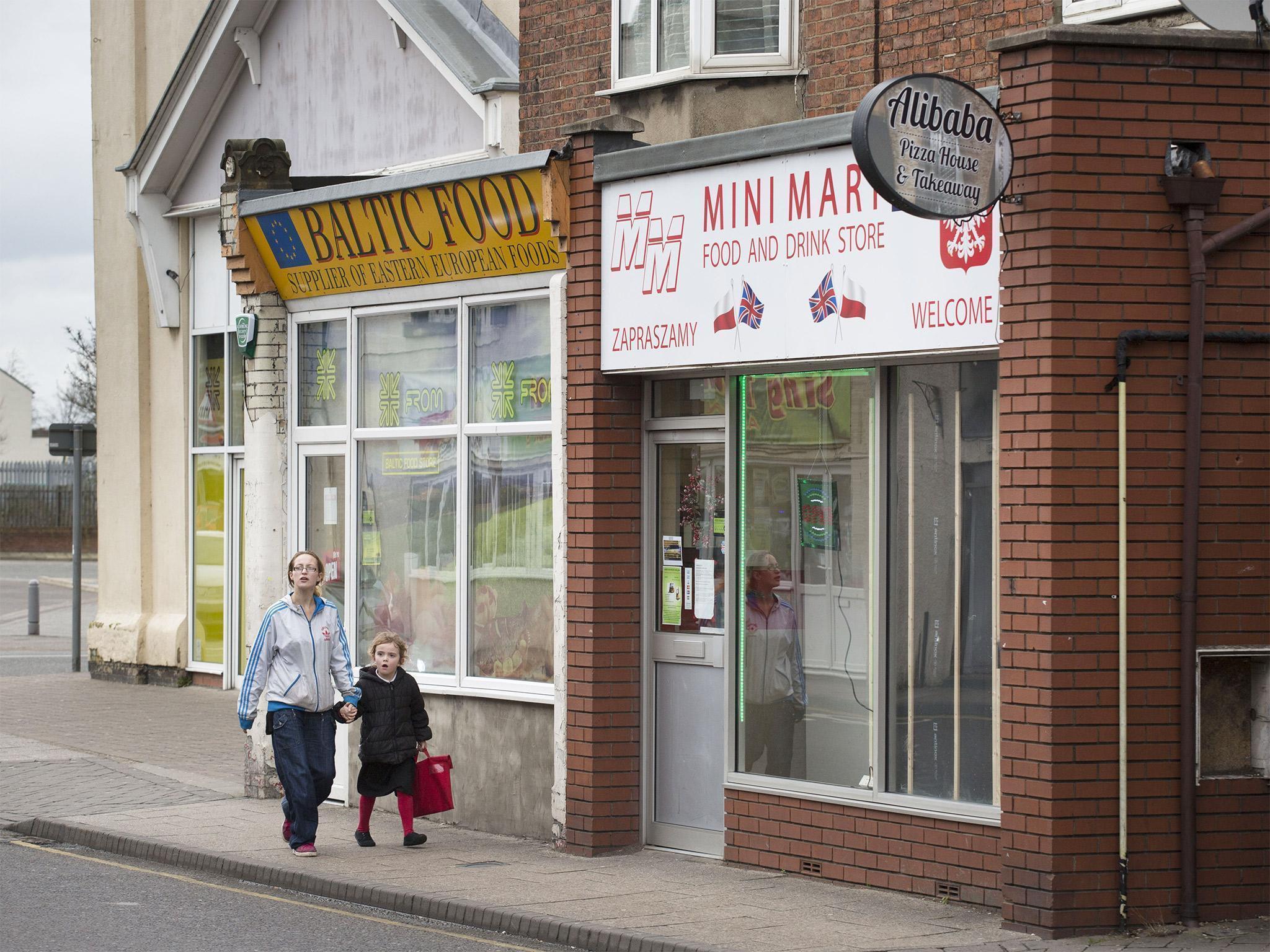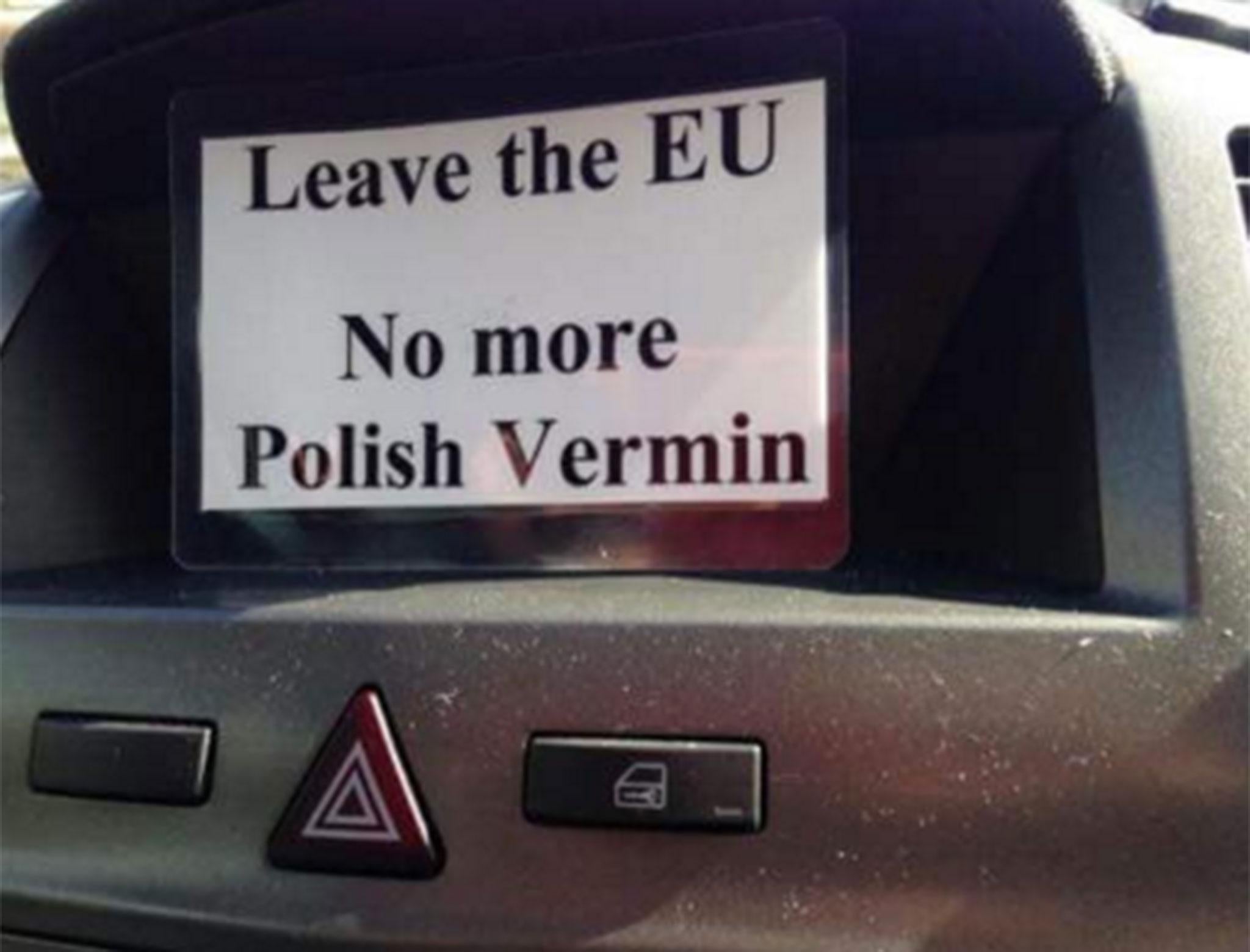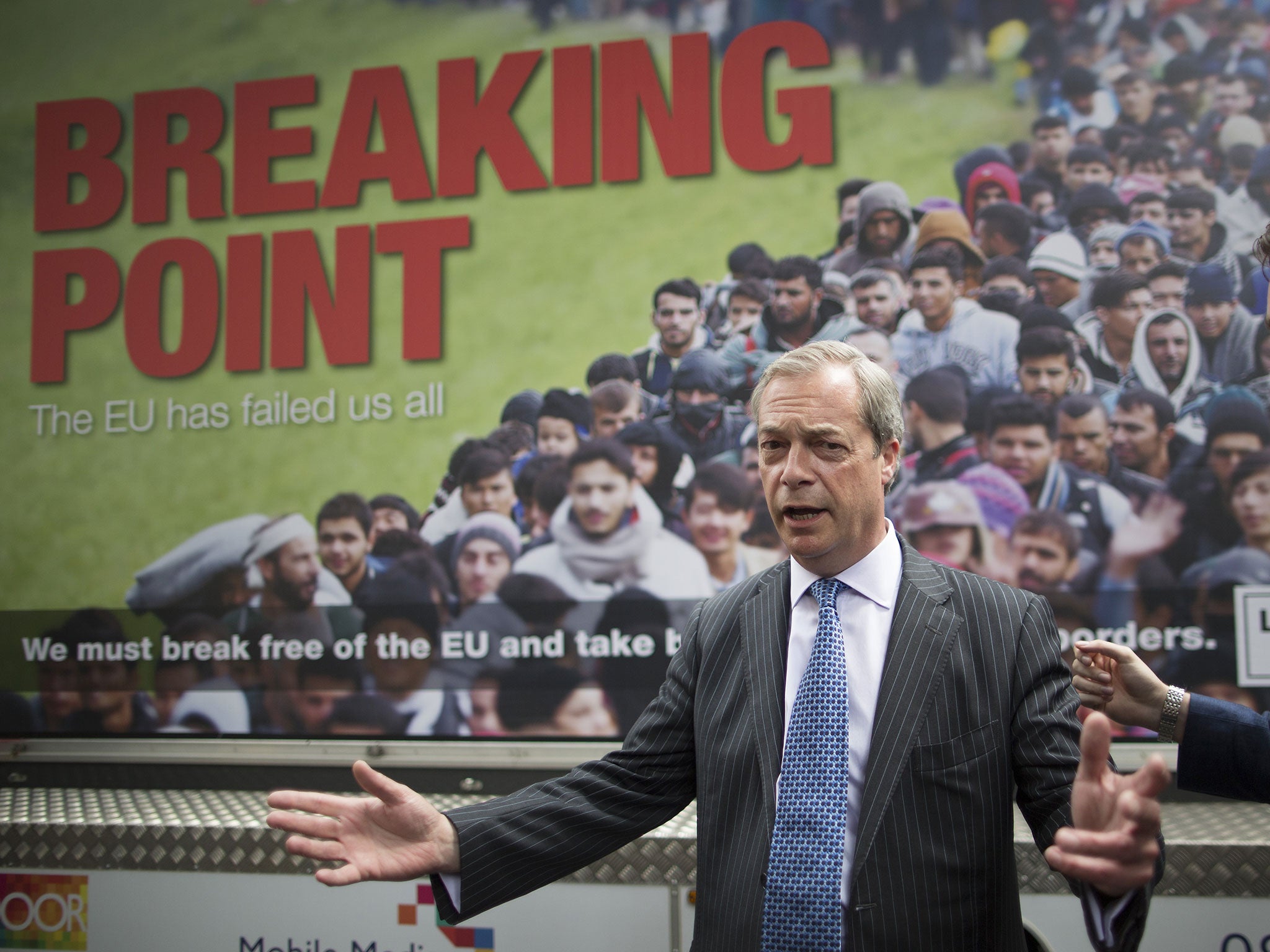Racism unleashed: 'Send the lot back' – on the road in post-referendum England
Cards saying 'Polish vermin', immigrants leaving because of the hostility – and a Ukip councillor talking about Albanian-Russian gang warfare, even though the police say it's 'totally false'

Your support helps us to tell the story
From reproductive rights to climate change to Big Tech, The Independent is on the ground when the story is developing. Whether it's investigating the financials of Elon Musk's pro-Trump PAC or producing our latest documentary, 'The A Word', which shines a light on the American women fighting for reproductive rights, we know how important it is to parse out the facts from the messaging.
At such a critical moment in US history, we need reporters on the ground. Your donation allows us to keep sending journalists to speak to both sides of the story.
The Independent is trusted by Americans across the entire political spectrum. And unlike many other quality news outlets, we choose not to lock Americans out of our reporting and analysis with paywalls. We believe quality journalism should be available to everyone, paid for by those who can afford it.
Your support makes all the difference.The two Polish mothers are hesitant at first. In the town of Boston, Lincolnshire, it seems you must watch what you say, and to whom. There’s no question of giving names. Fear of repercussions hangs heavy.
“It started the day after the referendum,” says the bright, articulate 30-year-old waitress. She tried to help another woman looking for accommodation.
“I asked the guy if the properties were still available. He said ‘Of course. What nationality is it?’
“I said Polish. He said ‘Sorry, no.’”
“Last week,” adds her 35-year-old friend, “a man at work called me a f***ing foreigner, made comments about foreigners taking benefits.
“Before the referendum, people tried to be nice, tried not to let it show. Now, some of them don’t even try. You see it in their faces.”
And with a wry smile, she notes that while she has a job, her female – British – neighbours are the ones claiming benefits.
Race hate incidents that have occurred since the June 23 EU Referendum
There might be more anecdotes than you get elsewhere, but they find their echo all over the UK, in the 500 accounts of race hate incidents collected by the twitter page PostRefRacism, the website iStreetWatch, the facebook group Worrying Signs and the Institute of Race Relations, and seen by The Independent.
They point to what Assistant Chief Constable Mark Hamilton, the national police lead on hate crime, has called “floating hate” – hiding in plain sight until, “for some people, the referendum vote gave them licence to spread their hate”.
And now the 35-year-old mother wonders whether all that hard work – in a factory, for the minimum wage, despite a Masters degree from Krakow University – was for nothing.
“Since the referendum,” she says, “My partner and I are thinking about leaving Boston.”
“Among my friends,” adds the waitress, “five families have already left the country.”
This is partly because they wonder if a Brexit Government will allow immigrants with less than five years’ residency to stay. But it’s also because of “the hostility”.
Already, for the past year, the 35-year-old and her partner have been driving to Spalding or Lincoln to do their supermarket shopping. In Boston, she says, “you can’t ask your husband one question in your own language, because someone will look at you like: ‘I want to kill you.’
“But we work hard, pay our taxes – so we are paying for their pensions. We spend money here, so we help the British economy.
“If we left, how many factories around Boston would shut because there would be no-one to work in them?”
“Nigel Farage,” she sighs. “There was a lot of propaganda. Someone has to explain to the British the real situation.”
To understand the force with which this is said, we might have to return to the beginning, to the start of our tour of what officialdom sometimes calls “migrant worker towns and countryside”, to the pleasant Cambridgeshire town of Huntingdon.
In the suburb of Stukeley Meadows, the sun shines on comfortable, substantial modern houses. A child’s party balloon drifts in the summer air.
Yet it was around here, on the morning after the EU referendum, that someone distributed laminated cards saying: “Leave the EU. No more Polish vermin.”

Across the flat fenland fields lies Spalding, Lincolnshire, the main town in South Holland, the district that recorded Britain’s second-highest Leave vote – 73.6 per cent.
Here, there is tragedy. Police tape cordons off the Castle Sports Complex. Three people have died in a shooting. Local schools were, for a time, in lockdown. Residents are terrified.
And Ukip county councillor Victoria Ayling is telling the Daily Express about gang warfare involving Russian and Albanian criminal gangs in Lincolnshire.
The first reaction of locals upon hearing of the shooting, she says, was "Oh God, it's the gang warfare again".
Yet it turns out only Britons were involved. Lance Hart, 57, is thought to have shot dead his wife, daughter and himself after learning his marriage was over. The involvement of Russian-Albanian gang warfare seems conspicuous by its absence.
Not to worry: Ms Ayling is tweeting: “Freedom of speech is dead. Am subject to a barrage of abuse just because I dare to report residents’ concerns about cause of shooting.”
She also offers a link to the Daily Express story headlined: “REVEALED: Warring migrant gangs engaged in bloody turf war near site of Spalding shooting.
“Warring gangs of migrant workers have been responsible for a spate of shootings” it says. “The Ukip councillor [Ms Ayling] revealed she has been informed of a sharp rise in shootings, including reports from hospital staff about the number of Eastern Europeans attending A&E with gunshot wounds.”
There is a line in the article making clear the Spalding shooting was unconnected to gang warfare, so let us not dwell on the bafflement of a Lincolnshire police source who told The Independent: “It’s so untrue, it’s perplexing how it got printed.
“Shooting incidents are incredibly rare in Lincolnshire. The idea of gunfights between East European gangs is totally false.”
But let us show due deference to Ms Ayling. After all, she says she is “very tempted” to run to become the next leader of Ukip.
And so, 15 miles up the A16, to Boston, which pipped South Holland to record the UK’s biggest Leave vote, with 75.6 per cent in favour of Brexit.
In the Fenside council estate, we chat to the first group of people we see enjoying the sun in their front garden.
A tattooed 57-year-old grandmother of 16 rises from her chair and points to the other houses in turn.
“Polish,” she says. “Polish… Polish, Polish, Polish… All down our street. They should send the f***ing lot back.”
“They took all the English jobs,” she says. “Kids can’t get spaces in the schools. They can’t get houses. But if you’re Polish, you get moved in straight away…”
You wonder whether you are hearing an early draft of a Nigel Farage newspaper article, perhaps his October 2015 offering, in which he wrote: “Our schools, hospitals and infrastructure are already reaching breaking point” – “breaking point”, of course, being the slogan for his referendum campaign poster, the one showing a flood of non-white refugees, all seemingly heading for Britain.

There’s no denying Boston’s immigration levels. Oxford University’s Migration Observatory has recorded that between 2001 and 2011 Boston experienced a 467 per cent rise in its foreign-born population, the highest proportional increase in the UK. In January the Policy Exchange think-tank rated Boston the least integrated town in England.
“Invaded?” says the 57-year-old former potato picker. “Yeah. It weren’t like this years ago.”
“You are frit of them,” she adds. “People get murdered in Boston. A lot of Polish are stabbing each other.”
And their black relatives are attacked too, one of them bottled for no reason by the intimidating, “badly racist” louts who drink by the banks of the River Witham.
“Some women don’t even dare walk to the cash machine,” says John, a 72-year-old who left school at 14 to work on the land.
They’re not racist. How could they be with all those black relatives, and in one woman’s case, an Angolan partner? And at points during the conversation, the “send the f***ing lot back” line does waver.
“There’s good ‘uns,” acknowledges the 57-year-old. “One of ‘em works in a factory, brings me meat every Wednesday…”
But in almost the next breath she admits: “Hate? Some of ‘em, yeah. When my family’s boys come home beaten up.”
Yet amid all these strident views, there seems to be little engagement with mainstream politicians who might put the pro-immigrant case.
The 57-year-old comes from a Labour voting family. Did she vote in the referendum? “Did I f***! [However you vote] nothing happens.”
But both she and her 61-year-old aunt nod in vindicated agreement when you read out: “Local children cannot get in their selected schools … People don’t know if they are living next door to rapists, murderers and paedophiles. Boston has double the national average of sex crimes…” The words of Elliott Fountain, of the far-right English Democrats, written in 2011, shortly after he was elected – alongside ex-BNP man David Owens – as a borough councillor for Fenside.
“David Owens, he was all right,” says the 61-year-old. They urge you to take a walk down West Street: “It’s Polak Street now.”
We stop for directions from a 47-year-old ex-Army corporal who spits out the words: “Too many f***ing foreigners. West Street? Most of the legal high drugs are sold there. Polish, Russians, riddling this town with drugs. There’s this shop ...”
And yet when you get there, the fabled “Polak Street” looks disappointingly like many other British shopping streets: a Pizza Hut, a Ladbrokes, a Co-op.
And the shop selling legal highs: yes, they sold them, until the Government banned them. And though the staff may be Polish, the owner… British born and bred.
But West Street does have a European Market store, and a Polish butcher, and a Polish restaurant, next to a Lithuanian patisserie. So ignore the fact that those alien "invading" Lithuanians are proudly displaying the competition-winning cake they baked for the Queen’s 90th birthday.
Widen it out to the whole of Boston, as the BNP did in January 2015; take seven photos – one of them of an Asian grocery shop – put them next to each other and you too can say: “Take a look at the photographic montage which illustrates how Boston is almost lost in a sea of Eastern European occupation.”
When constructing a racist narrative, it always helps to build from a small kernel of truth.
As Jakub, 25, a thoughtful Polish-born shopkeeper, acknowledges when talking about the louts drinking by the river.
“It’s like every stereotype,” he says. “Some people came here to escape from the law, from payment for kids in Poland. Things like getting drunk make them a stereotype. But it’s only one part of the people who are here. Just as not every Muslim is a bomber.”
Similarly, the Lincolnshire police source may be astounded by the English Democrats claim that Boston has double the national average of sex crimes – “I’ve worked here 10 years and never heard that figure.”
There may also be caution about newspaper reports that used Home Office statistics to rate Boston the “murder capital” of the UK, with 15 murders or attempted murders per 100,000 residents: “The problem with per capita figures is that many Boston population statistics aren’t accurate [because of the influx of immigrants].”
But there is an acknowledgement: “Boston has had its fair share of violence. Not shootings, but there have been stabbings. It’s well documented that some people involved in that come from other cultures.”
Indeed the local newspaper has – entirely legitimately – put on its front page a story about a Lithuanian accused of stabbing to death a 61-year-old German in Fenside.
Because murders make headline news. While "East European goes to work, does job, goes home, causes no trouble" is daily life, not a front page scoop.
As for that East European having stolen a British job: the angry ex-corporal may talk about immigrants “taking all the jobs and working for £4.50 an hour”. But when you speak to someone actually involved in recruitment in Boston, you are told: “For every one British applicant, there are 20 to 30 Europeans.”
It’s “absolute crap” that East Europeans are taking British jobs, “absolute rubbish” that he and others are hiring them on sub-minimum wage rates – the law would be on to them if they did.
And Boston’s unemployment rate is comfortably below the national average – bearing out studies which found areas with higher employment rates for immigrants also tended to have more of the UK-born population in work.
And yet, somewhere in Boston, two Polish mothers seem less than confident such anti-racist counter-narratives will prevail. Instead they fear a younger generation will learn from their parents’ hatred.
“Three days ago,” says the 30-year-old, “my friend’s son, about 15 years old, was talking to another Polish boy, at school, in Polish. The English boys started punching them.”
“How long,” she asks, “are we going to stay here with this aggressive behaviour towards us? Imagine, now, all the Polish, all the Latvians leave the UK?”
She questions what might happen to the economy. You wonder what it might say about the British.
Join our commenting forum
Join thought-provoking conversations, follow other Independent readers and see their replies
Comments